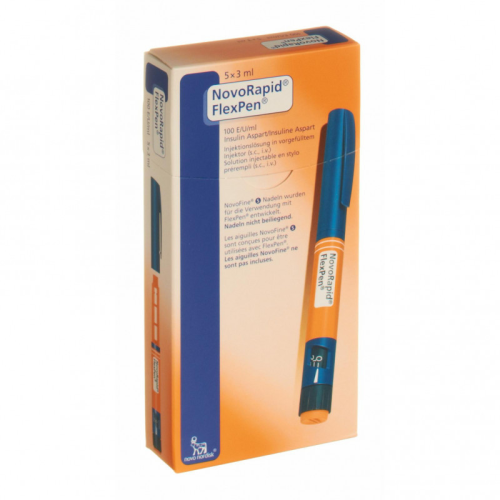Novorapid Flexpen
- Brand: Novo Nordisk
- Product Code: Novorapid Flexpen
- Availability: In Stock
-
$104.00
CLASSIFICATION
Hormone and Synthetic Substitute / Antidiabetic Agent
ACNE
No
WATER RETENTION
No
HBR
No
HEPATOTOXICITY
No
AROMATIZATION
No
MANUFACTURER
Novo Nordisk
WAREHOUSE
International Warehouse 2
SUBSTANCE
Insulin
,
Insulin is a potent anabolic hormone vital for the proper functioning of the human body, produced by all individuals. Although naturally synthesized, those with diabetes often require exogenous insulin. Some athletes also use it to promote lean muscle growth, but caution is crucial due to the potentially fatal risks associated with off-label use.
Exogenous insulin was first introduced in the 1920s, derived from the pancreases of dogs and later from cattle and pigs. While purity was initially a concern, its life-saving potential for diabetics was widely recognized. Animal-derived insulin was deemed a risk worth taking in the absence of alternatives, despite impurities. By the 1970s, these purity issues had largely been addressed, leading to the launch of synthetic insulin by Ciba in 1975. In 1982, Humulin-R, a synthetic version identical to human insulin, was approved by the FDA.
Insulin Functions and CharacteristicsProduced by the pancreas, insulin is classified as a peptide hormone responsible for glucose, amino acid, and fatty acid regulation and utilization, while also inhibiting the breakdown of glycogen, fat, and protein.
Diabetes patients may require insulin for two primary types: Type I diabetes, where the body lacks sufficient insulin production, and Type II diabetes, where insulin is produced but not effectively utilized due to cellular recognition issues, often linked to obesity.
Insulin positively influences the liver, promoting the conversion of glycogen to glucose and inhibiting the formation of non-carbohydrates into glucose. It facilitates the entry of glucose into cells, supporting muscle growth, and heightened insulin levels have been associated with improved protein synthesis and bone density, as well as increased production of Insulin-Like Growth Factor-1 (IGF-1), another anabolic hormone resembling insulin.
Additionally, insulin has been shown to promote an increase in Luteinizing Hormone (LH) and Follicle Stimulating Hormone (FSH), which could lead to heightened testosterone production, although the effect is not particularly strong.
Effects of InsulinInsulin's primary role is to regulate blood sugar levels, which is crucial for all types of diabetes. Its significant anabolic and anti-catabolic properties also benefit athletes, but inappropriate use can lead to rapid fat gain and serious health risks, including death if not used carefully.
Athletes often find insulin's anabolic and anti-catabolic effects appealing, but maintaining control over body fat is essential. When insulin levels rise, the body’s ability to burn existing fat diminishes. To mitigate negative metabolic effects and maximize insulin's anabolic potential, a strict, well-planned diet is essential. It's advisable for athletes to use insulin immediately after rigorous weight training, alongside food intake, which will be discussed in the administration section.
Insulin can facilitate substantial increases in lean muscle mass over a relatively short time, though managing body fat gains can be challenging, achievable under proper circumstances. The use of anabolic steroids with insulin and Human Growth Hormone (HGH) is commonly recommended for enhanced performance, as they can help regulate body fat.
Potential Side Effects of InsulinThe primary side effect associated with insulin use is hypoglycemia, particularly a concern in performance settings. While those with diabetes might not face significant issues with correct dosing, the risk remains high for others. Hypoglycemia involves dangerously low blood sugar levels, which can provoke a range of symptoms, from dizziness and hunger to severe complications, including death.
Common symptoms of hypoglycemia include:
If these symptoms arise, it's crucial to consume fast-acting carbohydrates immediately. Foods like candy or sugary drinks are effective choices. Regardless of symptoms, individuals should avoid sleeping after taking insulin to prevent the risk of severe hypoglycemia during sleep. In extreme cases, if severe hypoglycemia occurs, immediate medical assistance is necessary. It’s advised never to use insulin alone; having someone present is essential for safety.
Severe hypoglycemia can lead to a diabetic coma, an extremely serious condition with potential fatality. While deaths linked to insulin use in athletics have been reported, lesser side effects include allergic reactions, such as swelling or irritation at injection sites, which are rare.
Repeated injections in the same area can also lead to localized fat deposits; thus, it’s important to rotate injection sites.
Insulin AdministrationDosing for diabetes can vary widely based on individual needs, and no universal standard exists.
For performance enhancement, multiple forms of insulin are available, including short and long-acting varieties, which will influence the overall dosing plan. A common performance dose is approximately 1 unit of insulin per 10 pounds of body weight, but beginners should start lower, often with 1 unit post-weight training, gradually increasing to find a suitable dose.
If symptoms of hypoglycemia appear, this indicates the dosage may be too high. Most men do not require high doses, even if many believe they do. After determining the appropriate dose, the hormone should be taken right after training, accompanied by a minimum of 100 grams of carbohydrates and protein (about 40-50 grams) consumed shortly after the injection.
In case of hypoglycemia, it's critical to have fast-acting carbohydrates readily available. Consuming carbohydrates can alleviate symptoms, and depending on individual factors, the required amount may be large. After consuming a post-injection meal, plan to eat soon after again.
Conclusion on Insulin UseInsulin is a crucial hormone for health and bodily functions. While it can significantly aid in muscle gain for athletes, its use carries serious risks. Many may find they do not need insulin for their performance goals and may achieve more favorable long-term results without it. Nonetheless, it remains popular within competitive bodybuilding circles, often used alongside other hormones. However, individuals who are not genetically predisposed or who engage in high performance with insulin may struggle with body fat control. Additionally, insulin is not detectable in drug tests, leading some athletes to use it alongside HGH and other medications for competitive advantage.

